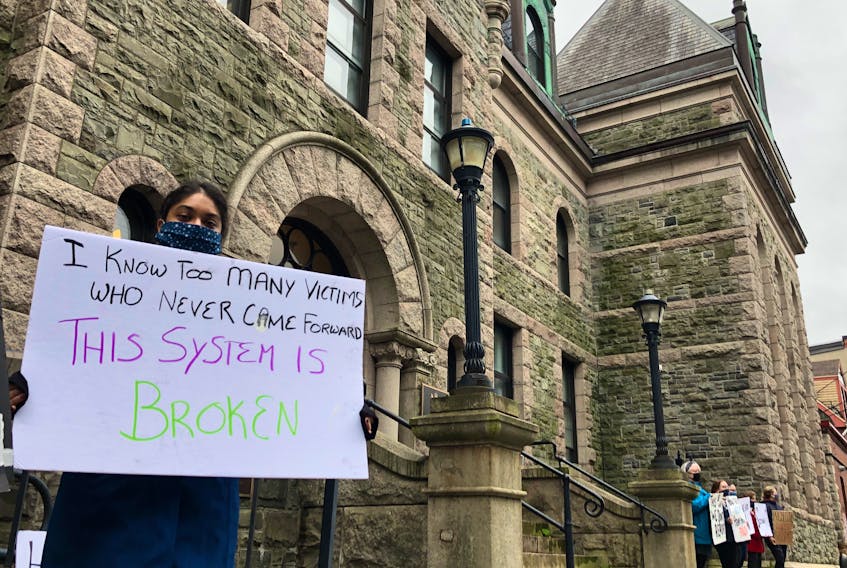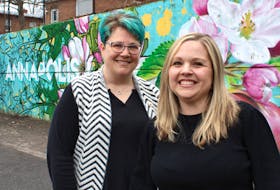ST. JOHN'S, N.L. — Let’s be clear, said advocates, legal professionals and survivors of sexual violence during an event in St. John’s last week. Ribbon-cuttings, flag-raisings and photo ops are great, but none of them is going to change the justice system.
Organized by the St. John’s Centre NDP District Association, the Nov. 25 event featured a panel discussion on judicial reform, with each member bringing a unique perspective and experience: Heather Elliott, community activist and anthropology graduate student, who took to the steps of Newfoundland and Labrador Supreme Court for 11 days in protest after the recent mistrial in the sexual assault case of RNC Const. Doug Snelgrove; Lynn Moore, a St. John’s-based lawyer who represents survivors of sexual abuse in civil cases; Janet Lee of the Journey Project, which provides legal navigation support for survivors of sexual violence; Jude Benoit, Mi’kmaq artist, co-founder of the Indigenous Activist Collective and the Trans March and activist for the LGBTQ+ and intersecting communities; and Laura Winters, executive director of the St. John’s Status of Women’s Council and Women’s Centre.
There were also poignant words from others in the room who shared their stories as sexual violence survivors fed up with a legal system they feel intimidated and failed them, from the point of reporting the crimes committed against them to the court process.
Others commented, in person and online, on a lack of public understanding of the impacts of sexual violence.
“The trauma that sexual assault causes was never really acknowledged in my life until I heard you (participants) here tonight,” one woman told the panel through tears. “And it was really very traumatic and it still is, since 1972.”
According to the provincial government, half the women in Newfoundland and Labrador will experience at least one incident of sexual or physical violence in their lifetime. An estimated 90 per cent won’t report the crime to police. Statistics Canada reported in 2018 that one in five survivors of sexual assault feels blamed for the crime committed against them.
The legal system often contributes to the victimization, the panellists said, and the bottom line is judicial reform.
A start would be mandatory training for provincial court judges and other legal system participants when it comes to sexual violence, some of the participants noted. Lee said the Journey Project has offered to provide that training.
“My expectation and my hope, should that training be mandated, is that it would move beyond sensitivity training to look at the neurobiology of trauma, the social context under which sexual violence continues to be perpetrated against individuals in our communities and how to better support survivors,” she said.
Removing the barriers faced by marginalized people, who deal with more than the typical challenges of sexual assault survivors when it comes to accessing justice, is another necessary measure, the panellists said. Expanding the province’s Family Violence Intervention Court — which sees an offender acknowledge their crime and agree to participate in rehabilitation programming in exchange for a more lenient sentence — to include sexual violence would go a long way in serving victims, they said.
Moore proposed a law defining conduct for defence lawyers in sexual assault cases, including limits on things like approaching a witness or yelling at them during cross-examination.
“Asking the same question 17 times shouldn’t be allowed,” she said. “There was one case in the 1990s in this province where a complainant was cross-examined for 30 days. That shouldn’t be allowed. A person has a right to full answer and defence, no question. The purpose of cross-examination is to test the witness. But there should be limits on that.”
Representatives of the provincial Department of Justice and the Office for the Status of Women attended the discussion, but made no detailed promises when The Telegram followed up for a reaction to the issues raised.
“There is no mandatory training for judges in any specific area of the law,” Justice Minister Steve Crocker said in an emailed statement, noting Canadian judges can participate in continuing education in many areas, including sexual assault and the conduct of sexual assault trials, through the National Judicial Institute.
The province supports federal Bill C-5, which seeks to ensure training for superior court judges related to sexual assault and require them to provide written reasons when ruling on sexual violence cases, he said.
The majority of sexual assault cases in this province are heard in the lower court.
The government is not considering establishing a speciality court for sexual assault trials, but says it's open to discussion.
Crocker encouraged survivors of sexual violence to contact the Journey Project, and said Victim Services is available to adult victims of crime, whether or not a police report has been made, with priority given to victims of violence.
“As a government, we cannot interfere with the judicial process,” Crocker said. “Trial procedure is set by the Criminal Code of Canada and prescribed by the constitution, both of which are the jurisdiction of the federal government. The rights of victims and accused must be protected through the trial process.
“Violence against women and girls is not solely a justice issue. We all have a role to play in addressing this issue. While we have made great strides, there is much work left to do and it will not come easy.”
Lisa Dempster, minister responsible for the Status of Women, told The Telegram she values the work of advocates and allies, and respects their opinions.
“We have heard about the need for a multifaceted, action-based plan that tackles systemic issues and has an impact on violence in our communities," she said in an email. “We are moving to change our approach to our violence-prevention work to look at systemic issues and tackle them head-on.”
Tackling them head-on requires radical change, panellist Benoit said.
“You have to completely tear down the house and rebuild it. You can’t just keep building on a foundation that’s falling apart.
“You can’t keep harming people and then expect them to heal. Healing and hurting do not coincide.”
Tara Bradbury reports on the courts and the justice system in St. John's.









